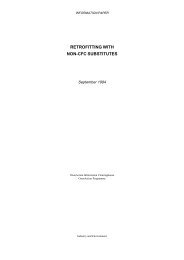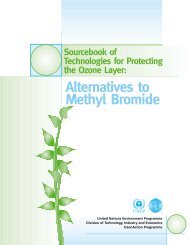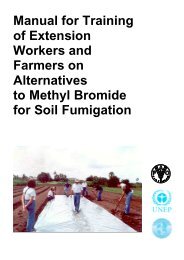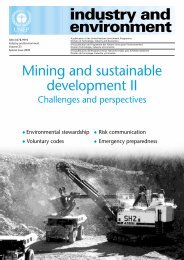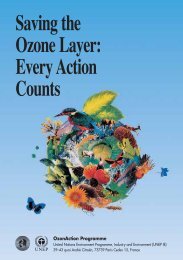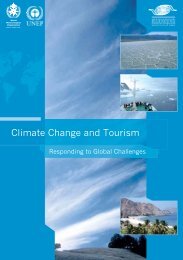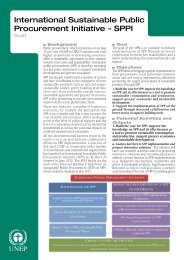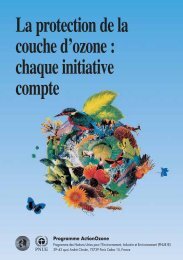industry and environment - DTIE
industry and environment - DTIE
industry and environment - DTIE
Create successful ePaper yourself
Turn your PDF publications into a flip-book with our unique Google optimized e-Paper software.
Chemicals management<br />
The Africa Stockpiles Programme: cleaning up obsolete pesticides;<br />
contributing to a healthier future<br />
Clifton Curtis, Director, <strong>and</strong> Cynthia Palmer Olsen, Senior Programme Officer,<br />
WWF’s Global Toxics Programme, WWF, 1250 24 th Street NW, Washington, DC 20037, USA (mailto:clifton.curtis@wwfus.org)<br />
An innovative, on-the-ground initiative is nearing operational launch in<br />
Africa, following nearly four years of preparations. The Africa Stockpiles<br />
Programme (ASP) is a multi-stakeholder partnership involving African<br />
countries, international agencies, non-governmental organizations, the private<br />
sector through CropLife International (CLI), <strong>and</strong> regional bodies.<br />
ASP’s goal is ambitious: to clean up <strong>and</strong> dispose of existing pesticide stockpiles<br />
throughout Africa within the next ten to 15 years, <strong>and</strong> to help prevent<br />
future accumulations, at a total cost of US$ 250-300 million. Thanks<br />
to Global Environment Facility (GEF) foundational support of $25 million,<br />
<strong>and</strong> co-financing from donor governments, over $50 million has been<br />
raised for the first phase of activities in 15 countries. Close to another $20<br />
million, however, is still required for phase 1 work <strong>and</strong> phase 2 planning.<br />
What is the problem?<br />
Stockpiles of obsolete pesticides have been identified throughout the<br />
African continent, many in rotting, rusting containers or bags that were<br />
stored or discarded up to 40 years ago. Some of the stockpiles contain<br />
extremely toxic pesticides including persistent organic pollutants (POPs),<br />
which are banned internationally by the Stockholm POPs Convention. As<br />
these chemicals spill <strong>and</strong> leach from their containers, they threaten rural<br />
<strong>and</strong> urban populations <strong>and</strong> contribute to l<strong>and</strong>, air <strong>and</strong> water degradation.<br />
Contamination of soil, air <strong>and</strong> water affects some of the poorest, most illfated<br />
communities across the continent. Many governments are aware of<br />
the dangers but lack sufficient funding <strong>and</strong> technical capacity to address<br />
this ever-worsening problem.<br />
Even in industrialized countries the regulation <strong>and</strong> management of pesticides<br />
is often inadequate. But in developing countries the lack of adequate<br />
resources for education, control <strong>and</strong> enforcement have translated<br />
into a far more precarious situation. In Africa alone, the buildup of obsolete<br />
pesticides has reached over 50,000 tonnes <strong>and</strong> has contaminated tens<br />
of thous<strong>and</strong>s of tonnes of soil.<br />
What caused it?<br />
The factors behind this accumulation include:<br />
◆ poor import controls;<br />
◆ inappropriate procurement <strong>and</strong> central purchasing policies;<br />
◆ untimely distribution;<br />
◆ inadequate stock management;<br />
◆ aggressive sales practices;<br />
◆ pressure to stockpile for unforeseen emergencies;<br />
◆ lack of coordination between donor agencies;<br />
◆ receipt of products that are outdated or mislabelled (or labelled in the<br />
wrong language).<br />
Despite the committed efforts of the Food <strong>and</strong> Agriculture Organization<br />
(FAO) <strong>and</strong> others over the last decade to address the pesticide stockpiles<br />
Pesticide barrels (PAN-UK)<br />
problem, these obsolete chemicals continue to accumulate more quickly<br />
than they are being removed. The clean-up of old pesticide stocks has rarely<br />
been perceived as a priority development issue, despite their health <strong>and</strong> <strong>environment</strong>al<br />
consequences <strong>and</strong> their disproportionate impact on the poor.<br />
How does the ASP solve the problem?<br />
At the national level, the ASP will contribute to national development <strong>and</strong><br />
country assistance strategies in the areas of public health improvement,<br />
poverty alleviation, <strong>environment</strong>al protection <strong>and</strong> the strengthening of the<br />
agricultural sector. At the global level, ASP will contribute to international<br />
efforts to eliminate POPs, improve the management of toxic chemicals<br />
<strong>and</strong> promote integrated pest management. Clean-up <strong>and</strong> disposal activities<br />
will be a direct implementation of the Stockholm POPs Convention <strong>and</strong><br />
the associated GEF operational programme aiming to reduce the impacts<br />
of POPs on the global food chain, transboundary waters, soil <strong>and</strong> biodiversity.<br />
The ASP will also contribute to the objectives of other international<br />
agreements such as the Rotterdam, Basel, Biological Diversity <strong>and</strong> Bamako<br />
Conventions, as well as the Montreal Protocol. 1<br />
How did the ASP come about?<br />
The idea of an Africa-wide stockpile clean-up project started to take shape<br />
during informal discussions at the final negotiating session of the Stockholm<br />
POPs Convention in Johannesburg, South Africa, in December<br />
2000. The initial participants included WWF, the Pesticide Action Network<br />
(PAN)-UK, CropLife International (CLI), the World Bank, the<br />
Food <strong>and</strong> Agriculture Organization of the United Nations (FAO), UNEP,<br />
the Secretariat for the Basel Convention, <strong>and</strong> the UN Industrial Development<br />
Organization (UNIDO). Exp<strong>and</strong>ed participation in subsequent<br />
planning has included the African Union, the Economic Commission for<br />
Africa, the New Partnership for African Development (NEPAD), PAN-<br />
Africa, the UN Institute for Training <strong>and</strong> Research (UNITAR) <strong>and</strong> the<br />
World Health Organization (WHO).<br />
How will the ASP be executed?<br />
The clean-up, disposal <strong>and</strong> prevention work will be done in conjunction<br />
with existing efforts related to the prevention <strong>and</strong> disposal of obsolete pesticides.<br />
Such an ambitious plan of action would only be possible with the<br />
active engagement of multiple partner organizations. NEPAD, for example,<br />
has identified the ASP as one of its highest priority initiatives, uniting<br />
Africans in finding common solutions to shared problems. At another<br />
level, CropLife International is participating as both donor <strong>and</strong> technical<br />
advisor, having committed several million dollars for disposal operations<br />
(in phase 1) <strong>and</strong> in in-kind contributions of technical assistance to countries<br />
for inventory, safeguarding, transport <strong>and</strong> destruction aspects of the<br />
programme.<br />
ASP implementation <strong>and</strong> institutional arrangements draw heavily on<br />
cooperation among the partners, their continued on page 38 ☞<br />
UNEP Industry <strong>and</strong> Environment April – September 2004 ◆ 37



